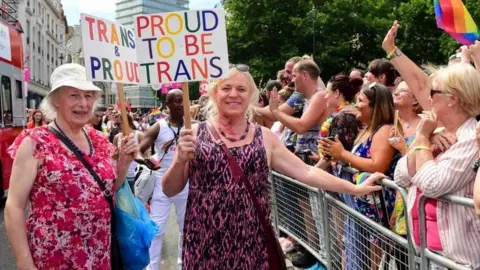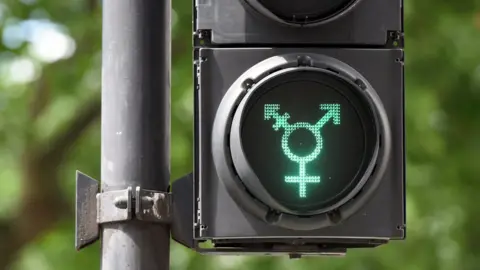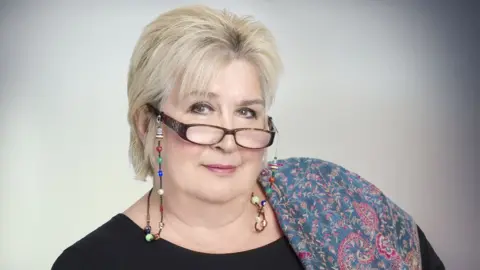Gender identity: What do legal changes have to do with women's rights?
 EPA
EPATrans activists have welcomed moves from the government to "streamline and de-medicalise the process" of changing legal gender. But some women are worried about the potential impact on their own legal rights.
Today, anyone who wants to legally change their gender in the UK has to apply for a Gender Recognition Certificate (GRC). Many don't though, because they feel the lengthy process is invasive and demeaning.
In order to qualify, trans people do not need to have had surgery but must have lived for two years in their preferred gender and have a diagnosis of gender dysphoria - distress caused by a mismatch between biological sex and gender identity.
One way to simplify things for trans men and women would be to allow individuals to self-declare the gender in which they choose to live, without the need for medical evidence or proof. That's what the government has now put out to consultation.
But the idea has been met with anger and shock in some forums including parenting website Mumsnet, where the latest in a series of threads attracted more than 1,000 comments in two days.
 Getty Images
Getty ImagesAt present, the guidance issued to service providers - women's refuges, for example - by the Equality and Human Rights Commission states: "Where a transsexual person is visually and for all practical purposes indistinguishable from someone of their preferred gender, they should normally be treated according to their acquired gender unless there are strong reasons not to do so."
Those with a GRC "should be treated in their acquired gender for all purposes".
That means that anyone who identifies themselves as a woman - whether that is their legal status or not - can already use separate-sex facilities such as changing rooms, toilets or single-sex gyms.
The proposed changes to the gender recognition act does not change that.
The concern is that the greater ease with which gender could be legally changed would give a tiny minority with nefarious motives greater opportunity.
The Equality Act 2010 also permits service providers - including hospitals and prisons - to use their discretion to refuse a trans person access to single-sex services on a case-by-case basis.
This legislation however, could also change.
A report on transgender equality published in January 2016 by Parliament's Women and Equalities Committee recommended discretion should not apply where a trans person had been recognised as their acquired gender "for all legal purposes" under the Gender Recognition Act - in other words, obtained a GRC.
And it's that which could get much easier in future.
 Getty Images
Getty ImagesA lot of the discussion online is around women-only spaces.
Refuges and rape centres, even changing rooms are places viewed as "safe" by women, some of them fleeing violence, because they typically exclude men.
Many of those commenting on Mumsnet fear that simply by choosing to call themselves women, "predatory males" - a minority who may want to abuse the system - could get access to those places and put women at risk.
Prisons are another area of concern, with warnings that biological males, some potentially dangerous, could be placed in facilities with vulnerable women.
In the world of sport, the users also fear women could find themselves at risk or unable to compete as they could be taking part alongside biological males.
GRCs do not however, affect the categorisation of people for sporting purposes. Sports authorities have their own rules. UK Athletics for example, says trans women can compete in their affirmed gender on providing hormonal evidence.
 Reuters
ReutersOne Mumsnet commentator, BahHumbygge, described "biological sex" as "vitally important", adding: "The idea that a predatory male can just decree by personal fiat he is now female and can now access any female-only space is simply horrifying."
"I fully support the right of people to dress how they like, call themselves what they like, and 99% of the time do whatever job they like or live wherever they like... But 1% of the time - women's prisons, women's spaces where they are naked and vulnerable, women's shelters and rape crisis centres - people with penises should not be in these spaces or taking jobs in those places," M0stlyBowlingHedgehog writes.
Mumsnet CEO Justine Roberts said the site's users were "deeply divided".
"It's a hugely complex and emotive issue that, sadly, seems to pit two vulnerable groups against each other," she added.
The fears expressed echo those raised by some in the feminist movement, including writer Sarah Ditum, who argues the move could create a system "vulnerable to exploitation and open to abuse".
"We have female-only spaces to protect women and help them participate in public life. It's taken a long time to establish women-only services," Sarah said.
"Discretion must be protected," she said, so that facilities such as prisons can continue to use their judgement on a case-by-case basis.
'Long overdue'
Set against these complaints are other voices, who stress the value of a law change to trans people.
"This gender bill would be an amazing step forward for trans rights. You are indeed on the wrong side of history," writes BuffyChiro.
Campaign group Stonewall called the current system "demeaning and broken".
Writer and broadcaster Paris Lees transitioned when she was a teenager. She has not applied for a GRC but her passport says she's female. She told the BBC anything to make the transitioning process "just a little bit easier" was "long overdue and great news".
She rejects the fears raised on Mumsnet and elsewhere as "absurd".

Reality Check: What does legally changing gender involve?

- It can take more than five years for trans men and women in England and Wales to legally change their gender under the current system
- To change gender in the eyes of the law, individuals have to apply for a certificate under the 2004 Gender Recognition Act
- They must be aged 18 or older and must live for two years in their preferred gender
- They need to have a diagnosis of gender dysphoria from a psychiatrist - a condition where a person experiences distress because of a mismatch between their biological sex and gender identity
- Once someone has this diagnosis, they can apply to a gender recognition panel - a legal tribunal which will look at the evidence submitted before deciding whether to issue a certificate
- People can change the gender on documentation including passports and driving licences without a gender recognition certificate

Gender vs sex
Critics of a change also warn about possible implications for data gathering.
If official information no longer distinguishes between natal sex and identified sex, statistics would inevitably be affected.
"This would obscure important trends in society," Sarah said, "like the gender pay gap, crime and male violence - especially with regard to who is committing crimes against who".
Trans people currently have explicit protection under the Equality Act if they've undergone "gender reassignment", be it medical or non-medical. Other so-called protected characteristics include race, religion, sex and disability.
But the term "gender reassignment" has been deemed outdated and a bill to change the protected characteristic to "gender identity", is awaiting its second reading in the House of Commons.
"Gender identity legislation makes it appear that sex discrimination doesn't exist anymore. But it does," said Sarah.

Stephanie Davies-Arai founded the Transgender Trend website - a group for parents to discuss transgender issues.
"Men could in effect identify their way into the protected category for women," she said.
What this means for women, Stephanie argues, is that the female sex would no longer have a protected category or political representation.
"'Women are oppressed on the basis of their biological sex, not their gender identity," she added. "There has to be a place for the female sex as a distinct group."
This argument - the distinction between sex and gender - is refuted by some, including trans activist and feminist author Julia Serano, who argues there are more than two discrete mutually exclusive sexes.
Instead, she argues sex is made up of a number of variable dimorphic traits - like chromosomes and reproductive organs - that sometimes align in a person, and sometimes don't.
Both Sarah and Stephanie have stressed their support for trans rights, but that hasn't stopped criticism being directed at them.
"There's a climate that if you challenge this - you are a trans-phobic, bigoted hater," Stephanie says.
The government's consultation is due to be published in the autumn, but until then the debate for all women's rights continues.
